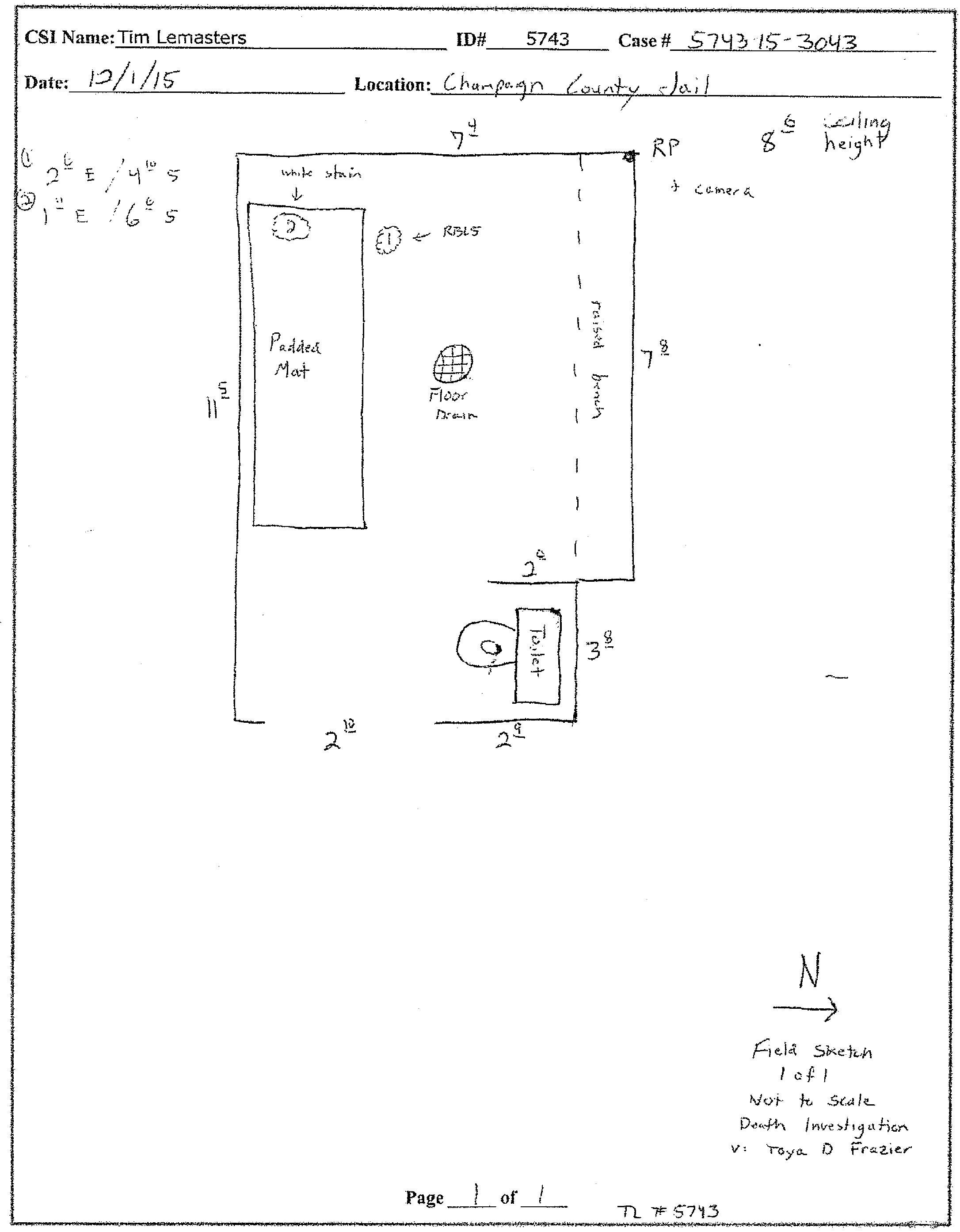 If you were to believe those like Champaign County Board Chair Pattsi Petrie, who spoke recently at a meeting of Champaign County’s Racial Justice Task Force, those in the local jail are dangerous people that shouldn’t be let out on the streets.
If you were to believe those like Champaign County Board Chair Pattsi Petrie, who spoke recently at a meeting of Champaign County’s Racial Justice Task Force, those in the local jail are dangerous people that shouldn’t be let out on the streets.
Yet the tragic story of Toya Frazier, who recently died in the jail, is the more common case of someone who was no violent criminal, but struggled for years with drug addiction and needed treatment. What she got instead was a death sentence by the Champaign County court system.
Toya Frazier was found dead December 1, 2015 at 5:11 p.m., alone in a cell at the Champaign County Satellite Jail. Guards were supposed to conduct checks every 15 minutes for those on medical watch like Frazier. She was screaming in pain throughout the previous night from what was apparently heroin withdrawal. According to video viewed afterwards, Frazier lay dead in her jail cell for nearly an hour and a half before she was discovered.
Her death would be blamed on the pills she snuck into the jail. But Frazier should not have been there in the first place. There is a lengthy waiting list at the Prairie Center, one of the few options for drug treatment in Champaign County. Those with private insurance can check in at Pavilion. For people who can’t get into either, there is the emergency room. For Frazier, it was a prison sentence.
This is one of two jail deaths within a four month period. On March 27, 2016, Paul Clifton was found dead after an asthma attack. He was in for a traffic offence. Both are African American. While they make up only 13% of the county population, Blacks are at least 60% of those in the jail. Anti-Black racism, whether in the veiled language of those like Petrie or the cruelty of jail guards, continues to snuff out Black lives.
Toya loved cooking and spending time with her nieces and nephews. No longer will the children be able to enjoy her home-cooked meals.
A Cry for Help
In July 2015, Frazier was sentenced to 42 months in the Illinois Department of Corrections for a guilty plea of felony theft. In exchange for dismissal of another theft and a burglary, Frazier pleaded guilty.
Frazier’s sentencing was delayed three times due to her poor health―she had a mild stroke in July, and knee surgery in August. She didn’t run, but turned herself in the morning of November 30, 2015. She was found dead the next day.
Champaign County Coroner Duane Northrup concluded Frazier’s death was “accidental.” The Illinois State Police conducted an investigation, interviewing guards, nurses, and other people in the jail that witnessed Frazier in pain. The state police produced a 300-page report, which I obtained through a public records request. I reconstruct Frazier’s unnecessary death below.
Correct Care?
When Frazier went through booking, she was screened by Beth Novak, a nurse that works for Correct Care Solutions, the Nashville-based private company that recently won the contract for medical services at the jail. Upon entering the jail, Frazier reported being a heroin user and having high blood pressure. In the police investigation, Novak recalled, “During the screening, Toya appeared to be sad and had a watery tear on her face.” She was given medication for heroin withdrawal and kept in the medical area of the jail.
At midnight, Benjamin,* who was in a cell next to Toya, was “awoken by a cry for help.” He told police she was “screaming” and complaining that her stomach hurt. After a few hours, a guard came in and asked Toya “what she wanted them to do for her.” She was told that the nurse would be in in the morning. After breakfast, Benjamin heard Toya screaming again and kicking on her door. There was such a commotion he thought someone was assaulting her, and he asked one of the guards to check on her.
She Was Just in a Lot of Pain
A woman who was Toya’s cellmate, Shawn, was also interviewed by police. She was woken up by Toya’s yelling, “Oh Lord takes this pain, the beast, the beast, oh Lord takes this pain.” Toya said she was experiencing heroin withdrawal. She apologized and asked her to “bear with me.” Shawn said the guards threatened Toya that “if she keeps it up,” the nurse would not give her medicine. Around 3 a.m., guards moved Toya to a 7-foot by 11-foot solitary confinement cell. The screaming still continued all morning until the “officers were getting pretty tired of it,” Shawn told investigators. “She was just in a lot of pain.”
This account was confirmed by Sgt. Arnold Mathews, a 14-year Sheriff’s veteran, who also reported that around 3 a.m., Frazier was “yelling, moaning, and groaning really loudly.” Sgt. Mathews ordered that Frazier be moved to a medical holding cell for women where she was kept by herself. A guard was to check on her every 15 minutes, and there was a video camera monitoring her in the cell.
 The morning of December 1, nurse Beth Novak didn’t get to the satellite jail until 9 a.m. Shortly after, Frazier received medication for her withdrawal symptoms. At 2:15 p.m., Novak spoke with Frazier who she said had a “happier” appearance than the previous day. Frazier asked “if she was getting her withdrawal medication,” but her request was denied. Novak said she was about to give her another dose when Frazier was found dead two hours later.
The morning of December 1, nurse Beth Novak didn’t get to the satellite jail until 9 a.m. Shortly after, Frazier received medication for her withdrawal symptoms. At 2:15 p.m., Novak spoke with Frazier who she said had a “happier” appearance than the previous day. Frazier asked “if she was getting her withdrawal medication,” but her request was denied. Novak said she was about to give her another dose when Frazier was found dead two hours later.
The Highest Highs Bring the Lowest Lows
In the police investigation that followed, video from the cell was reviewed by an “independent” multi-jurisdictional team. Champaign Police Sgt. David Griffet completed a report at 10 p.m. the night it happened. According to the report, Champaign County Sheriff’s Deputy Lieut. Robert Cravens had observed video from the cell and noted that the “last movement observed for Toya was at 1550 hours (3:50 p.m.).”
Illinois State Police Sgt. Windy Westfall also watched the video and recorded her findings. According to a report filed by Windfall, at 3:23 p.m., Frazier pulled out a tissue apparently with pills, put them into her mouth, and put the tissue into her sock.
At 3:50 p.m., Westfall wrote in her report, “Frazier is laying on her mat, and she made some small movements that appeared to possibly be a seizure. Frazier never moved again after that.”
Dinner was delivered at 4:43 p.m. by a guard who left a food tray on the sink.
A guard returned at 5:11 p.m. to pick up the tray and found Frazier “unresponsive.” CPR was performed, but Frazier had been lying there for nearly an hour and a half, and was already dead.
A toxicology report found that Frazier had died due to excess levels of Diphenhydramine, an ingredient contained in over-the-counter Aleve PM. Sheriff Dan Walsh claims she had hidden them in a walking cane she brought with her into the jail for her bad knee. The Coroner said that Frazier was likely self-medicating for the pains of withdrawal.
For anybody who has experienced, or witnessed someone who has experienced, heroin withdrawal, it is an excruciating sickness. The highest highs bring the lowest lows.
Toya Frazier didn’t need a jail cell to break her addiction. She needed community-based treatment, and the support of family and friends.
What are we willing to do for people like Toya who need to overcome a drug addiction? Can we provide treatment? Or will we send them to jail, and wait for a million-dollar lawsuit for neglect to convince us we need another solution?
*Full names have been withheld to protect the privacy of individuals involved.
